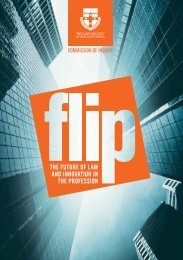Legal Mosaic Essays on Legal Delivery
1Tx15vb
1Tx15vb
You also want an ePaper? Increase the reach of your titles
YUMPU automatically turns print PDFs into web optimized ePapers that Google loves.
<str<strong>on</strong>g>Legal</str<strong>on</strong>g> <str<strong>on</strong>g>Mosaic</str<strong>on</strong>g>: <str<strong>on</strong>g>Essays</str<strong>on</strong>g> <strong>on</strong> <str<strong>on</strong>g>Legal</str<strong>on</strong>g> <strong>Delivery</strong><br />
ways. The first involved going up to a stranger and saying that I would<br />
pay them $20 if they would take 5 minutes to listen to a story and relate<br />
its message back to me. I would present the case for the first 3 minutes;<br />
the next 2 minutes were spent listening to the stranger provide a take <strong>on</strong><br />
what I had told them. If they understood the story, I was ready for trial.<br />
Almost. That brings up the sec<strong>on</strong>d part of the final preparati<strong>on</strong>. I would<br />
open each trial with the same line, substituting <strong>on</strong>e word at its end. I<br />
would say: “This is a case about (<strong>on</strong>e word; fill in the blank). I recited<br />
this sentence to begin opening and closing statements. In those instances<br />
when I was permitted to poll the jury, they almost unanimously said<br />
they had focused <strong>on</strong> that <strong>on</strong>e word (greed, opportunity, competiti<strong>on</strong>,<br />
etc.) to frame the case. It’s not that the cases were simple—most of<br />
them were highly complex—but I knew that if I drilled them down to<br />
the essence for the trier of fact and framed things in my self-selected<br />
simple term, I had a big advantage. To analogize to the IBM c<strong>on</strong>tract<br />
modificati<strong>on</strong>, it was easier to “get to yes” by simplifying things and<br />
sticking to what was relevant and material.<br />
Keeping Things Simple<br />
Is it hubris that prevents most lawyers from simplifying their work?<br />
Or is it perpetuati<strong>on</strong> of the myth that what they do is bespoke? Perhaps,<br />
as noted previously, ec<strong>on</strong>omic incentives are the antag<strong>on</strong>ist of<br />
simplicity. That would change were fixed-price billing and transparent<br />
statements of work (who, what, when, and how much for handling the<br />
case?) the new standard for legal engagement. Lawyers would be well<br />
served to simplify things for themselves and for their clients. One way<br />
to achieve that is to ask the client at the incepti<strong>on</strong> of each engagement:<br />
“What is your objective?” Not <strong>on</strong>ly is this a key driver of case strategy,<br />
but also—and more fundamentally—it eliminates misc<strong>on</strong>cepti<strong>on</strong>s and<br />
aligns expectati<strong>on</strong>s. Imagine hiring a c<strong>on</strong>tractor to build an additi<strong>on</strong> to<br />
your home and have work commenced without any prior discussi<strong>on</strong> of<br />
style, finishes, square footage, use, workers, and price? That remains<br />
30



